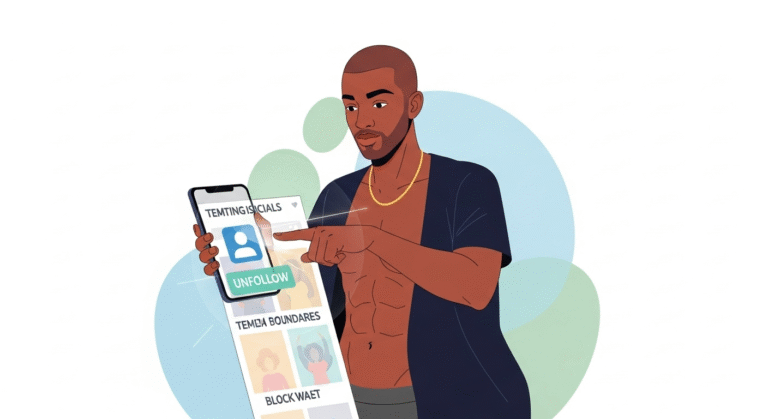How to Stop Yourself From Social Media Stalking & Heal

Social media stalking: Constantly checking someone’s social media — especially an ex’s — can feel like a reflex: one scroll leads to another, and before you know it hours have gone by and you feel worse. This guide addresses that digitally-amplified pain point directly. You’ll learn why the urge happens, clear actions to unfollow their highlight reel, boundaries to create friction, emotional practices to process loss, and sustainable replacements so you can stop social media stalking and move forward. The good news? Breaking this cycle is absolutely possible with the right strategies and commitment to your healing journey.
Social media stalking: Understand the urge: why you keep checking
Before you can effectively stop social media stalking, you need to understand what drives this behavior. Social media platforms are designed to be addictive, exploiting our natural curiosity and need for connection through intermittent reward schedules. When it comes to checking an ex’s profile, these psychological triggers become even more powerful because they’re amplified by unresolved emotions and attachment needs. Think of it like a slot machine — you never know what you’ll find when you check their story or feed, which creates a compulsive checking pattern that’s hard to break. The uncertainty of whether they’ve posted something new, are they dating someone else, or seem happier without you creates an irresistible pull that overrides logical thinking. Understanding that this urge is both psychologically normal and artificially amplified by technology helps remove shame and creates space for practical solutions.
- Identify your specific triggers: Are you more likely to check late at night, when you’re bored, after drinking, or when feeling particularly lonely? Recognizing patterns helps you prepare for vulnerable moments.
- Recognize the reward loop: Social media uses unpredictable updates to create compulsive checking behaviors — your brain gets a small dopamine hit from new information, even when it ultimately makes you feel worse.
- Note your emotional goals: Are you seeking validation that they miss you, trying to monitor their happiness level, or hoping to find closure? Naming these underlying needs helps address them more directly.

Social media stalking: Audit and prune your feed: unfollow, mute, and declutter
One of the most immediate and effective ways to stop social media stalking is to remove or reduce exposure to triggering content. This might feel dramatic or even rude, but prioritizing your mental health over social politeness is crucial for healing. Start with the obvious step: unfollow your ex completely. This isn’t about being petty — it’s about creating the space you need to process your emotions without constant digital reminders of what you’ve lost. But don’t stop there. Often, mutual friends, their family members, or even accounts that remind you of shared experiences can trigger the same compulsive checking behaviors. Consider this process like decluttering your living space after a breakup — you’re removing items that keep you stuck in the past so you can move toward your future.
- Unfollow accounts that provoke comparison or obsession; prioritize your peace over politeness. This includes your ex, their close friends, and anyone whose content consistently triggers painful emotions.
- Use mute or ‘hide story’ options for mutual friends or connections you can’t fully remove. Most platforms allow you to stay connected while filtering out their day-to-day updates.
- Consider temporarily blocking or restricting if unfollowing feels insufficient; some situations require a complete digital boundary while emotions are still raw.

Social media stalking: Add friction: make checking harder
Since most social media checking happens impulsively rather than intentionally, adding small barriers can dramatically reduce the behavior. The goal isn’t to make social media completely inaccessible, but to interrupt the automatic habit loop that leads to stalking behaviors. When you have to take deliberate steps to access someone’s profile, you create a pause that allows your rational mind to engage before your emotions take over. This technique works because the urge to check is often fleeting — if you can delay gratification for even a few minutes, the compulsion usually passes. Think of it like putting cookies in a hard-to-reach cabinet; you can still get them if you really want them, but the extra effort often helps you make a more conscious choice about whether you actually want to indulge.
- Log out after each use, delete apps temporarily, or move social media icons off your home screen to create intentional friction between impulse and action.
- Set app limits using built-in screen time controls, or use Focus/Do Not Disturb modes during your most vulnerable hours (often late evenings or early mornings).
- Schedule specific, limited check-in times rather than allowing open-ended browsing; treat social media like you would any other potentially addictive activity — with clear boundaries and time limits.
Social media stalking: Conclusion
Learning how to stop social media stalking and get over your ex requires a combination of self-awareness, practical digital boundaries, emotional processing, and healthy replacement habits. The strategies outlined here work because they address both the behavioral patterns and the underlying emotional needs that drive compulsive checking. Start with small, reversible steps — unfollow or mute triggering accounts, add one piece of friction like logging out after use, and pick one alternative activity to try the next time the urge hits. Remember that progress isn’t about perfection; it’s about gradually regaining control over your attention and emotional life. Track your wins, be compassionate with yourself during setbacks, and trust that with consistent effort, you can break free from the cycle of digital surveillance and focus your energy on building the fulfilling life you deserve. Your future self will thank you for taking these brave steps toward healing.